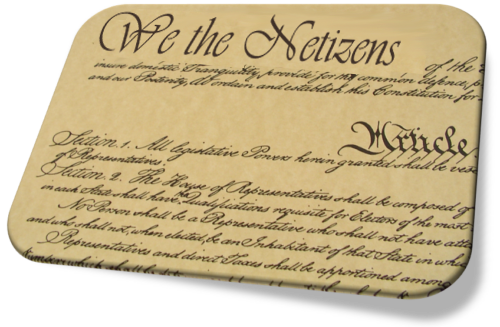Preamble:
We, the Netizens of the internet, recognize the vast and transformative power of this global network to connect people, share ideas, and facilitate the exchange of information. As such, we believe it is necessary to establish a set of principles to guide the use and development of the internet, in order to ensure that it remains a space that is open, fair, and accessible to all.
Article 1: Freedom of expression and access to information
The internet shall be a forum for the free exchange of ideas, and all Netizens shall have the right to access and share information without fear of censorship or discrimination. Governments and private entities shall not unduly restrict or inhibit the free flow of information on the internet.
Article 2: Privacy and security
Netizens of the internet have the right to privacy and security in their online activities. Governments and private entities shall not collect or disseminate personal information about Netizens without their explicit consent, except in accordance with the rule of law and due process.
Article 3: Net neutrality
The internet shall be a level playing field, and all users shall have equal access to the full range of online content and services. Internet service providers shall not discriminate against or favor any particular websites or services, or charge different rates for access to different types of content.
Article 4: Accessibility
The internet shall be accessible to all individuals, regardless of their economic or technological resources. Governments and private entities shall take reasonable steps to ensure that internet access is available and affordable to all members of society.
Article 5: Innovation and competition
The internet shall be a space that fosters innovation and competition. Governments and private entities shall not engage in practices that stifle competition or limit the ability of new entrants to enter the market.
Article 6: Cybersecurity
Governments and private entities have a responsibility to protect the security and integrity of the internet. All users shall take reasonable precautions to secure their online activities and protect against cyber threats.
Article 7: International cooperation
The internet is a global network, and international cooperation is necessary to ensure its continued growth and development. Governments and private entities shall work together to address common challenges and promote the responsible use of the internet.
Article 8: Freedom from online harassment and abuse
Netizens have the right to be free from harassment and abuse. Governments and private entities shall take steps to prevent and address instances of online harassment and abuse, and hold individuals accountable for their actions.
Article 9: Digital literacy and education
All Netizens have the right to access digital literacy and education resources in order to fully participate in the digital world. Governments and private entities shall provide opportunities for individuals to develop the skills and knowledge necessary to engage with the internet in a safe and responsible manner.
Article 10: Digital divide
Governments and private entities have a responsibility to address and reduce the digital divide, in order to ensure that all members of society have equal access to the benefits and opportunities afforded by the internet.
Article 11: Online consumer protection
Netizens interacting with online products and services have the right to fair and transparent practices, and to be protected from fraud and deceptive business practices. Governments and private entities shall take steps to protect the rights of those Netizens.
Article 12: Intellectual property
Netizens have the right to respect for their intellectual property, and to have their creations protected from unauthorized use. Governments and private entities shall establish and enforce laws and policies that safeguard intellectual property rights.
